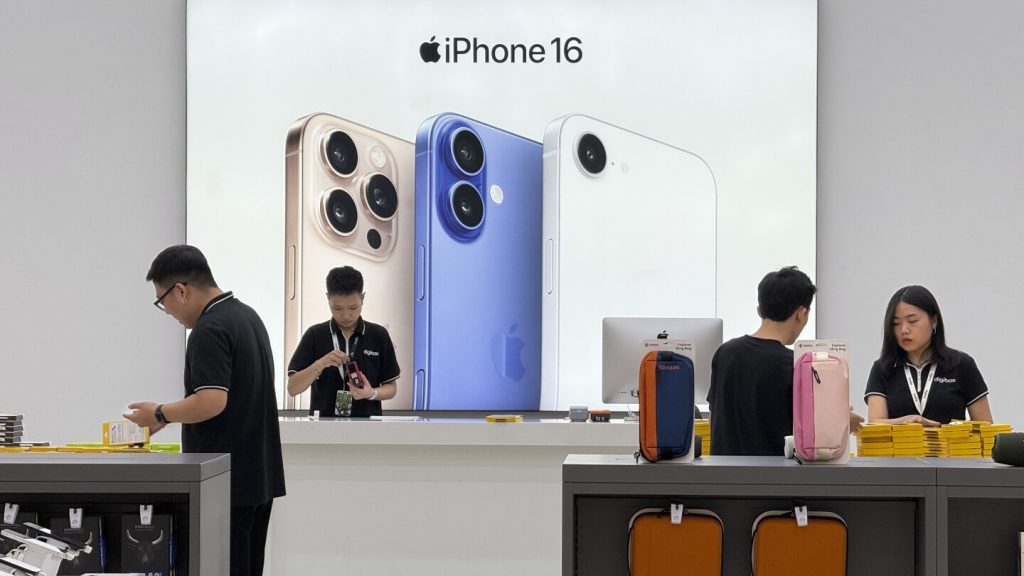Confusion over President Donald Trump’s tariffs remains following a weekend of questions around trade in consumer electronics.
On Friday the Trump administration paused its new taxes on electronics imported into the U.S. — signaling some relief from trade wars that have particularly escalated with China, a major exporter of technology from smartphones to laptops. But these goods remain subject to other levies.
And officials have also indicated that additional, sector-specific tariffs targeting electronics are on the way — all of which economists warn will raise costs and lead to higher prices for consumers.
Here’s what we know.
Are electronics exempt from Trump’s newest tariffs?
Late Friday, the U.S. Customs and Border Protection said that electronics, including smartphones and laptops, would be excluded from broader, so-called “reciprocal” tariffs — meaning these goods wouldn’t be subject to most tariffs levied on China to date or the 10% baseline levies imposed on other countries.
But U.S. Commerce Secretary Howard Lutnick later said that this was only a temporary reprieve — telling ABC’s “This Week” on Sunday that electronics will be included under future sector-specific tariffs on semiconductor products, set to arrive in “probably a month or two.”
And not all of the levies that the U.S. has imposed on countries like China fall under the White House’s “reciprocal” categorization. Hours after Lutnick’s comments, Trump declared on social media that there was no “exception” at all, adding to confusion. Trump instead argued that these goods are “just moving to a different” bucket. He also said that China will still face a 20% levy on electronics imports as part of his administration’s prior move related to fentanyl trafficking.
How has China responded?
On Sunday, China’s commerce ministry welcomed a partial reprieve on consumer electronics — but continued to call for the U.S. to completely cancel the rest of its tariffs.
Chinese President Xi Jinping reiterated that on Monday, writing in an editorial jointly published in Vietnamese and Chinese official media that “there are no winners in a trade war.” He added that both China and the U.S. “should resolutely safeguard the multilateral trading system, stable global industrial and supply chains, and open and cooperative international environment.”
Tit-for-tat tariffs between the U.S. and China have escalated to new heights over recent months. Since taking office in January, Trump has imposed a series of levies that now amount to 145% taxes on a range of imports from the country.
In response, China has hit back with its own measures, including tariffs on U.S. goods that currently total 125%. Its Commerce Ministry has also said it will impose more export controls on rare earths, used in high-tech products such as computer chips and electric vehicle batteries.
What could reducing tariffs on electronics mean for consumers?
Tariffs are taxes on goods imported from other countries. And because so many of the electronics we buy rely on a global supply chain, economists have warned that tariffs impacting consumer technology could mean higher prices for your next smartphone, computer or other gadgets.
Reducing the size of those tariffs, even temporarily, could delay or lessen that impact. But it’s unlikely that price hikes will be totally avoided. Electronics will still be taxed by previous (non-“reciprocal”) tariffs — and potentially under additional, sector-specific levies down the road.
It would also be incredibly difficult for companies to change their supply chains. The Trump administration argues that tariffs will entice big names like Apple, for example, to make iPhones in the U.S. for the first time. But Apple has spent decades building up a finely calibrated supply chain in China — and it would take years and cost billions of dollars to build new plants in the U.S.
Wendong Zhang, an assistant professor of applied economics and policy at Cornell University, says the tariffs’ impact on consumer tech reflects how difficult a “full decoupling between U.S. and China” is. Products like laptops, smartphones and the components needed to make them accounted for nearly $174 billion in U.S. imports from China last year.
Trump signaled on Monday that he had spoken to Apple CEO Tim Cook before exempting electronics from some of his China tariffs — telling reporters that he had “helped” Cook with the partial reprieve, while separately saying he plans to provide temporary exemptions for auto makers that may also need “a little bit of time.” Apple did not immediately respond to The Associated Press’ request for statement.
How is Wall Street reacting?
Tariffs have plunged financial markets worldwide into turmoil — particularly battering stocks following of Trump’s sweeping announcement on April 2. That cooled after news of this partial electronics exemption, as well as last week’s pause of steeper tariffs outside of China.
On Monday, the S&P 500 climbed 0.8%, though trading was still shaky, and it briefly gave back all of its big early gain of 1.8%. The Dow Jones Industrial Average rose 312 points, or 0.8%, and the Nasdaq composite added 0.6%.
Still, the relief could be fleeting. While the partial electronics reprieve indicates that Trump is watching markets, Zhang notes, it and other looming actions also show that the administration’s “tariff strategy is a lot more about the leverage and signaling … as opposed to coherent long term trade framework.”
Overall, uncertainty remains high — making it hard for many companies trying to solidify long-term plans when conditions seem to change daily.
“Businesses thrive on stability because they plan around rules of engagement … Ergo, markets perform better when businesses are confident that the rules are really the rules,” Dipanjan Chatterjee, vice president and principal analyst at Forrester, wrote in a Monday note. Still, he added, businesses will need to avoid knee-jerk reactions while evaluating risk. “When Friday’s policies are thrown out with Sunday’s brunch leftovers, companies will resort to one primary strategy: do as little as possible and thereby do no harm.”
_______
AP Writers Josh Boak in Washington, Mae Anderson in Nashville, Tennessee and Matt O’Brien in Providence, Rhode Island, contributed to this report.

